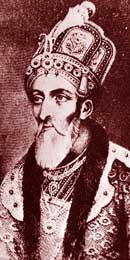|
|
| High drama |
The Partition of India in 1947 was a tragedy of a scale unknown in the history of mankind. Ten million people were uprooted from their homes to find new ones across borders. Hundreds of thousands were butchered in cold blood. Who was responsible? Name any of the leaders of the time and the verdict will be guilty, with the sole exception of Mahatma Gandhi. Leaders are presumed to have their hands on the pulse of the people. Either their fingers had gone numb and they did not feel how dangerously fast it was throbbing or they were blind to the consequences. The two men on top, Jawaharlal Nehru and M.A. Jinnah, believed that as soon as Partition was completed, peace would be restored and religious minorities in either country would be assured of safety of their lives and property. This did not happen. To this day, over half a century after the division, we continue to pay the price of their folly.
There is library full of literature on the Partition. Many novels, short stories and poems have been written on the subject. Many films have also been made on the theme. But, for the first time, a celebrated scholar of contemporary Indian history has tried to dramatize the event for the stage.
Shashi Joshi of the Institute of Advanced Studies in Shimla has tried her hand at play-writing. The result is The Last Durbar: A Dramatic presentation of the Division of India. She knows her subject and has made good use of authentic records of the proceedings. She has been sparing in the use of fictional mirch masala to spice up her dialogue. What is lacking is a sense of drama and suspense. To start with, you cannot have 89 characters in any stage play. The scene shifts from Delhi, Shimla to Karachi, Lahore and back to Delhi; from one home to another. Some acts last a bare two minutes: others go on for over 20. none of the characters really come alive — not even the star player, Lord Louis Mountbatten. Maybe producers like Girish Karnad or Ebrahim Alkazi could re-mould it. It could certainly be put to good use in a film.
The task of dividing a subcontinent like India along communal lines was daunting, as every dividing line would leave millions of hapless minorities in the country where they felt insecure. This was most acute in the case of Sikhs, who would be split in two equal halves. Then there was the problem of 500-odd princely states, some of them, such as Hyderabad and Travancore, wanted to become independent. There were also Hindu dominated states like Junagarh, whose nawab wanted to accede to Pakistan, and Hari Singh of Kashmir, who could not make up his mind till Pathan tribals aided by Pakistan invaded his state. No one had much sympathy for the ruling princes, not even Mountbatten, who knew some as his friends. He described them as “enlightened autocrats at the best, squalid degenerates at the worst....They are really a bunch of nit wits.” It took a man like Sardar Patel, deputy prime minister and home minister, to bring them to heel as if they were his pet dogs.
The play ends with the Mountbattens bidding farewell to their huge domestic staff on the steps of the Rashtrapati Bhawan. I cannot think of such a tame ending to high drama.
Entirely unconnected with events covered by Shashi Joshi, there is a doggerel she quotes about the snobbery of the sahiblog which I was unaware of:
The men who live in Poona would infinitely sooner
Play single-handed polo, a sort of
Solo-polo
Than play a single chukka with a chap
Who isn’t pukka.
Where there is no will
Cricket fans complained to God
“Have we done a heinous sin?
We prayed to you day and night
Still our team did not win!”
God laughed and gently said
“I know you prayed and did pray
But how could your paper tigers win
When they didn’t have the will to
play?’
Not for sale
An American MNC executive came to India and travelled by his own car from north to south, exploring business prospects. His car developed some trouble at Delhi and he went to the Jama Masjid looking for a mechanic who will be able to repair American cars. One mechanic assured him his safe journey upto Jaipur with his jogadh-type mechanism. At Jaipur, his car developed some problems again. This time too, another mechanic assured him — with his own jogadh — that he would reach Bhopal. Like that, he was able to complete his travelling schedule.
During his meeting with the prime minister, he offered to buy the Indian jogadh technology at a huge price. The PM refused his offer saying that jogadh technology was not saleable since his own government was running on that technology.
(Contributed by B.K. Pabreja, Gurgaon)











